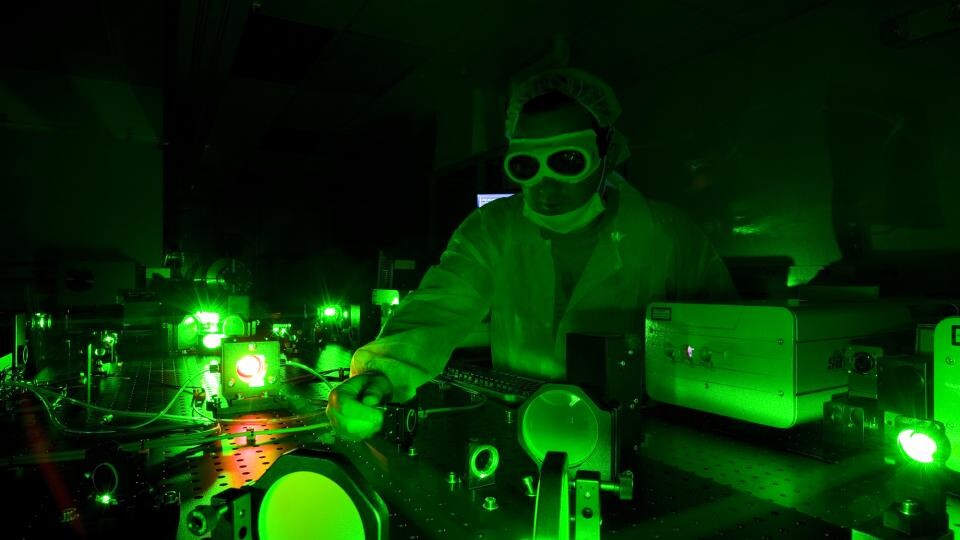
Research at universities is often considered to be complete at the time of publication of an article in a scientific journal. But fundamental research can also point toward solutions to pressing national security or defense issues.
A number of faculty from UNL and across the University of Nebraska are engaged in NU’s National Strategic Research Institute, a collaboration between the university and the United States Strategic Command. NSRI aims to be a global leader in research on combating weapons of mass destruction.
Established in 2012, the institute already has attracted $15 million in contract funding for NU faculty to pursue critical research projects focused on advancing national security — including projects led by Ligon that analyze how enemies might use cyber-terrorism to attack the United States.
Don Umstadter, Leland J. & Dorothy H. Olson Chair in Atomic, Molecular and Optical Physics in UNL’s Department of Physics, is among the institute’s researchers, pioneering the science, technology and applications of extreme light with the high-powered Diocles laser. This work relates to NSRI’s core capability for better detection of nuclear materials.
“Our recently developed technology uniquely allows us to ‘see’ what was previously invisible,” Umstadter said. “Also, our ongoing fundamental scientific research will undoubtedly lead to other breakthroughs that provide the Department of Defense with unforeseen advantages.”
“The reality is, weapons of mass destruction present a grave threat to the American public. The cutting-edge research taking place at the University of Nebraska is helping to keep that threat to a minimum,” said Robert Hinson, founding executive director of the National Strategic Research Institute and a retired U.S. Air Force Lieutenant General. “Our faculty are leading experts in their fields and they have helped us get off to a terrific start. I’m proud of the work we’re doing to keep our country safe and support our men and women in uniform, and I’m excited about what’s to come.”
The National Strategic Research Institute is one component of NU’s 2015-17 biennial budget request, which includes a $20 million economic competitiveness package that seeks to advance initiatives related to workforce development, talent recruitment, public-private partnerships, and research and innovation. About $1.5 million of the package would be directed to NSRI to support personnel and programmatic needs of the institute during its early stages. The university expects the institute to become self-supporting in the near future after additional contract awards are received.
The National Strategic Research Institute is the newest of 13 University-Affiliated Research Centers (UARCs) across the United States, all of which are affiliated with leading research universities and involve a long-term partnership with the Department of Defense. The Massachusetts Institute of Technology, Johns Hopkins University and Penn State University — all national leaders in research and development expenditures financed by the Department of Defense — are among the other prestigious universities hosting a UARC.
NU’s institute focuses on five core areas of expertise demonstrated by NU faculty: nuclear detection and forensics; detection of chemical and biological weapons; passive medical defense against weapons of mass destruction; consequence management; and space, cyber and telecommunications law.
For example, Kenneth Bayles, associate vice chancellor for basic science research and professor of pathology and microbiology at the University of Nebraska Medical Center, is working to develop a more effective vaccine for anthrax that could be used in the field in the event of a bioterrorism attack. His research project, which has received more than $750,000, supports six employees.
“The National Strategic Research Institute has allowed me to expand my research to include more translational research – research that could apply to finding cures for diseases, vaccine development, and development of antidotes. It could directly benefit individuals who will be exposed to biodefense agents,” Bayles said. “UNMC is ideally suited for this type of research because we have the secure laboratory space, expertise and experience for the development of improved countermeasures against chemical and biological weapons.”
Other initial projects at the National Strategic Research Institute include:
Jeyamkondan Subbiah, Kenneth E. Morrison Distinguished Professor of Food Engineering and associate professor in the Department of Biological Systems Engineering at UNL, is conducting research that could lead to more thorough and rapid responses to foodborne outbreaks affecting Department of Defense or Department of State personnel in the United States or other countries.
Mario Scalora, professor of psychology at UNL and an expert in threat assessment, is analyzing strategies that can “prime” potential adversaries to be more receptive to messages that could deter them from deploying weapons of mass destruction.
James Talmadge, UNMC professor of pathology and microbiology, is working on strategies that can better protect soldiers from biological weapons. He leads a team focused on formulating a vaccine for Ebola, which is estimated to have killed nearly 5,000 people thus far in the current outbreak in West Africa. While no vaccine yet exists, two Americans have been successfully treated at the Biocontainment Patient Care Unit in Omaha.







